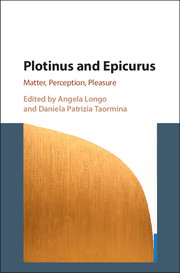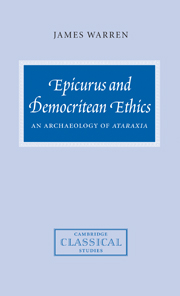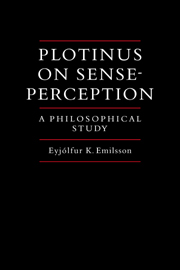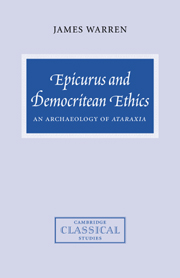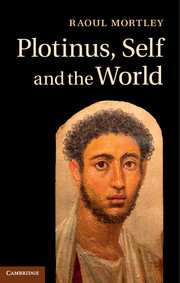Plotinus and Epicurus
This volume investigates the reasons why Plotinus, a philosopher inspired by Plato, made critical use of Epicurean philosophy. Eminent scholars show that some fundamental Epicurean conceptions pertaining to ethics, physics, epistemology and theology are drawn upon in the Enneads to discuss crucial notions such as pleasure and happiness, providence and fate, matter and the role of sense perception, intuition and intellectual evidence in relation to the process of knowledge acquisition. By focusing on the meaning of these terms in Epicureanism, Plotinus deploys sophisticated methods of comparative analysis and argumentative procedures that ultimately lead him to approach certain aspects of Epicurus' philosophy as a benchmark for his own theories and to accept, reject or discredit the positions of authors of his own day. At the same time, these discussions reveal what aspects of Epicurean philosophy were still perceived to be of vital relevance in the third century AD.
- Argues for a new perspective on the relationship between Epicureanism and Platonism
- Offers fresh interpretations of ancient philosophical doctrines
- Examines fundamental concepts including pleasure and happiness, providence and fate, and matter and the role of sense perception
Reviews & endorsements
'The volume has a clear and comprehensive stage-setting introduction by the editors and a full biography. There is hardly a sentence in the Enneads that is not rooted in the history of philosophy as Plotinus knew it. This book s a valuable addition to the scholarship seeking to illuminate this background.' Lloyd P. Gerson, Bryn Mawr Classical Review
Product details
August 2016Hardback
9781107124219
254 pages
235 × 158 × 17 mm
0.49kg
Available
Table of Contents
- Preface Daniela Patrizia Taormina
- Introduction Angela Longo and Daniela Patrizia Taormina
- Part I. Historical Overview:
- 1. The school and texts of Epicurus in the early centuries of the Roman empire Tiziano Dorandi
- Part II. Common Anti-Epicurean Arguments in Plotinus:
- 2. The mention of Epicurus in Plotinus' tr. 33 (Enn. II 9) in the context of the polemics between Pagans and Christians in the second-third century AD: parallels between Celsus, Plotinus and Origen Angela Longo
- 3. Epicureans and Gnostics in tr. 47 (Enn. III 2) 7.29-41 Manuel Mazzetti
- 4. 'Heavy birds' in tr. 5 (Enn. V 9) 1.8: References to Epicureanism and the problem of pleasure in Plotinus Mauricio Pagotto Marsola
- 5. Plotinus, Epicurus and the problem of intellectual evidence: tr. 32 (Enn. V 5) 1 Pierre-Marie Morel
- 6. 'What is known through sense perception is an image'. Plotinus' tr. 32 (Enn. V 5) 1.12-19: an anti-Epicurean argument? Daniela Patrizia Taormina
- Part III. Plotinus' Criticism of Epicurean Doctrines:
- 7. Corporeal matter, indefiniteness and multiplicity: Plotinus' critique of Epicurean atomism in tr. 12 (Enn. II 4) 7.20-8 Marco Ninci
- 8. Plotinus' reception of Epicurean atomism in On Fate, tr. 3 (Enn. III 1) 1-3 Erik Eliasson
- Part IV. Epicureans Elements in Plotinus: Some Instances:
- 9. Athroa epibolē: on an Epicurean formula in Plotinus' work Andrei Cornea
- 10. Plotinus and Epicurus on pleasure and happiness Alessandro Linguiti.

